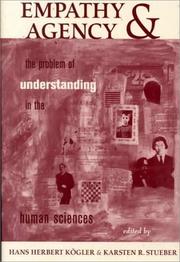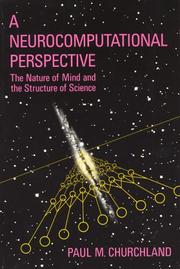| Listing 1 - 5 of 5 |
Sort by
|

ISBN: 0429980469 1429486511 9780786743445 0786743441 9780429980466 0813391202 9780813391205 0813391199 9780813391199 Year: 2000 Publisher: Boulder (Colo.) : Westview press,
Abstract | Keywords | Export | Availability | Bookmark
 Loading...
Loading...Choose an application
- Reference Manager
- EndNote
- RefWorks (Direct export to RefWorks)
How do we, as interpreters and theorists in the human and social sciences, understand agency? What are the methods, models, and mediating theoretical frameworks that allow us to give a reliable and adequate account of beliefs, actions, and cultural practices? More specifically, how can we as interpretive analysts employ our own cognitive capacities so as to render the beliefs, intentions, and actions of other human beings intelligible? These are the leading questions that a group of well-established social philosophers explore in this volume in light of the most recent (and hotly debated) find
Psychology --- Science and psychology. --- Empathy. --- Philosophy.
Book
ISBN: 131565489X 0822981718 1317320433 1317320441 1781440069 9781315654898 9781317320449 9781317320425 1317320425 9781317320432 9781848933590 Year: 2016 Publisher: London New York Routledge
Abstract | Keywords | Export | Availability | Bookmark
 Loading...
Loading...Choose an application
- Reference Manager
- EndNote
- RefWorks (Direct export to RefWorks)
Smith takes an in-depth look at the question of free will through the prism of different disciplines in the late nineteenth and early twentieth centuries.
Science and psychology --- Free will and determinism --- History --- 1800-1899 --- Great Britain
Book
ISBN: 0826106242 9780826106247 9780826106230 0826106234 Year: 2013 Publisher: New York Springer Publishing Company
Abstract | Keywords | Export | Availability | Bookmark
 Loading...
Loading...Choose an application
- Reference Manager
- EndNote
- RefWorks (Direct export to RefWorks)
This handbook is the definitive resource for scholars and students interested in how research and theory within each of the major domains of psychology-developmental, cognitive, personality, and social-have been applied to understand the nature of scientific thought and behavior. Edited by two esteemed pioneers in the emerging discipline of the psychology of science, it is the first empirically based compendium of its time. The handbook provides a comprehensive examination of how scientific thinking is learned and evolves from infancy to adolescence and adulthood, and combines developmental an
Science --- Science and psychology --- Psychology and science --- Psychology --- Natural science --- Natural sciences --- Science of science --- Sciences --- Psychological aspects
Book
ISBN: 0199588627 9780199588626 0191750778 0198794533 1299356052 0191641138 9780191641138 9781299356054 0192514997 9780191750779 Year: 2013 Publisher: Oxford: Oxford university press,
Abstract | Keywords | Export | Availability | Bookmark
 Loading...
Loading...Choose an application
- Reference Manager
- EndNote
- RefWorks (Direct export to RefWorks)
We are living in a stressful world. Despite our familiarity with the notion, stress remains an elusive concept. In The Age of Stress, Mark Jackson explores the history of scientific studies of stress in the modern world. In particular, he reveals how the science that legitimates and fuels current anxieties about stress has been shaped by a wide range of socio-political and cultural, as well as biological, factors: stress, he argues, is both a condition and a metaphor. This approach is not designed or intended to deny the reality of stress in people's lives, or to undermine the validity of scientific investigations. Rather, Jackson suggests that if we are to comprehend the ubiquity and impact of stress in our own times, or to explain how stress has commandeered such a central place in the modern imagination, we need to understand not only the evolution of the medical science and technology that has gradually uncovered the biological pathways between stress and disease in recent decades, but also the shifting political and cultural contexts that have invested that scientific knowledge with meaning and authority. In particular, he argues that we need to acknowledge the manner in which our obsessions with the relationship between stress and disease are the product of broader historical concerns about the preservation of personal and political, as well as physiological, stability.
Stress (Psychology) --- Stress (Physiology) --- Science and psychology --- Diseases --- Causes and theories of causation --- Stress --- Sciences et psychologie --- Etiologie --- Emotional stress --- Mental stress --- Psychological stress --- Tension (Psychology) --- Mental health --- Psychology --- Diathesis-stress model (Psychology) --- Life change events --- Type A behavior --- Physiological stress --- Tension (Physiology) --- Adaptation (Biology) --- Diseases - Causes and theories of causation

ISBN: 0262270323 0585020450 0262531062 0262031515 9780262270328 9780585020457 9780262031516 9780262531061 9780262531061 Year: 1992 Publisher: Cambridge: MIT Press,
Abstract | Keywords | Export | Availability | Bookmark
 Loading...
Loading...Choose an application
- Reference Manager
- EndNote
- RefWorks (Direct export to RefWorks)
Philosophy of mind --- Science --- Cognitive science --- Neural computers --- Science and psychology --- Humanities --- Mental Processes --- Personality --- Natural Science Disciplines --- Psychological Phenomena and Processes --- Disciplines and Occupations --- Behavior and Behavior Mechanisms --- Psychiatry and Psychology --- Philosophy --- Intelligence --- Cognition --- Philosophy & Religion --- Speculative Philosophy --- Sciences --- Cognitive Function --- Cognitions --- Cognitive Functions --- Function, Cognitive --- Functions, Cognitive --- Philosophical Overview --- Hedonism --- Stoicism --- Overview, Philosophical --- Overviews, Philosophical --- Philosophical Overviews --- Philosophies --- Psychologic Processes and Principles --- Natural Sciences --- Physical Sciences --- Discipline, Natural Science --- Disciplines, Natural Science --- Natural Science --- Natural Science Discipline --- Physical Science --- Science, Natural --- Science, Physical --- Sciences, Natural --- Sciences, Physical --- Personalities --- Human Information Processing --- Information Processing, Human --- Psychology and science --- Neural net computers --- Neural network computers --- Neurocomputers --- Natural science --- Science of science --- Mind, Philosophy of --- Mind, Theory of --- Theory of mind --- Pharmacy Philosophy --- Pharmacy Philosophies --- Philosophies, Pharmacy --- Philosophy, Pharmacy --- Psychologic Processes --- Psychological Processes --- Phenomena, Psychological --- Processes, Psychologic --- Processes, Psychological --- Psychological Phenomenas --- Psychological Processe --- Human Characteristics --- Psychology --- Electronic digital computers --- Natural computation --- Artificial intelligence --- Metaphysics --- Philosophical anthropology --- Normal science --- Philosophy of science --- Philosophy. --- Cognitive science. --- Neural computers. --- Philosophy of mind. --- Science and psychology. --- Sciences cognitives --- Ordinateurs neuronaux --- Philosophie de l'esprit --- Sciences et psychologie --- Philosophie
| Listing 1 - 5 of 5 |
Sort by
|

 Search
Search Feedback
Feedback About UniCat
About UniCat  Help
Help News
News